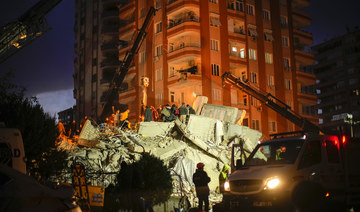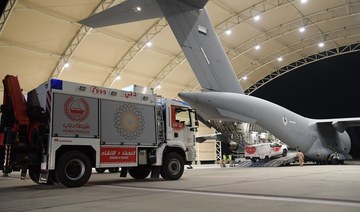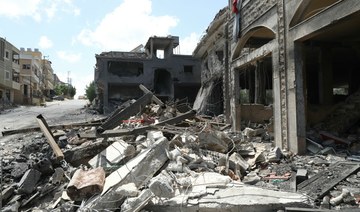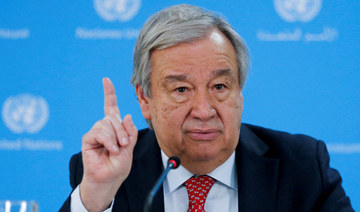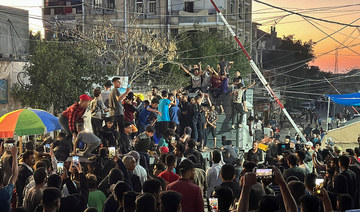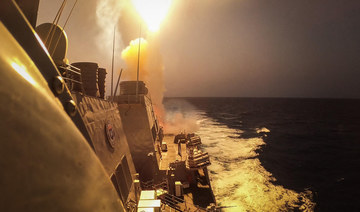JINDERIS, Syria: Residents digging through a collapsed building in a northwest Syrian town discovered a crying infant whose mother appears to have given birth to her while buried underneath the rubble from this week’s devastating earthquake, relatives and a doctor said Tuesday.
The newborn girl’s umbilical cord was still connected to her mother, Afraa Abu Hadiya, who was dead, they said. The baby was the only member of her family to survive from the building collapse Monday in the small town of Jinderis, next to the Turkish border, Ramadan Sleiman, a relative, told The Associated Press.
Monday’s pre-dawn 7.8 magnitude earthquake, followed by multiple aftershocks, caused widespread destruction across southern Turkiye and northern Syria. Thousands have been killed, with the toll mounting as more bodies are discovered. But dramatic rescues have also occurred. Elsewhere in Jinderis, a young girl was found alive, buried in concrete under the wreckage of her home.
The newborn baby was rescued Monday afternoon, more than 10 hours after the quake struck. After rescuers dug her out, a female neighbor cut the cord, and she and others rushed with the baby to a children’s hospital in the nearby town of Afrin, where she has been kept on an incubator, said the doctor treating the baby, Dr. Hani Maarouf.
Video of the rescue circulating on social media shows the moments after the baby was removed from the rubble, as a man lifts her up, her umbilical cord still dangling, and rushes away as another man throws him a blanket to wrap her in.
The baby’s body temperature had fallen to 35 degrees Celsius (95 degrees Fahrenheit) and she had bruises, including a large one on her back, but she is in stable condition, he said.
Abu Hadiya must have been conscious during the birth and must have died soon after, Maarouf said. He estimated the baby was born several hours before being found, given the amount her temperature had dropped. If the girl had been born just before the quake, she wouldn’t have survived so many hours in the cold, he said.
“Had the girl been left for an hour more, she would have died,” he said.
When the earthquake hit before dawn on Monday, Abu Hadiya, her husband and four children apparently tried to rush out of their apartment building, but the structure collapsed on them. Their bodies were found near the building’s entrance, said Sleiman, who arrived at the scene just after the newborn was discovered.
“She was found in front of her mother’s legs,” he said. “After the dust and rocks were removed the girl was found alive.”
Maarouf said the baby weighed 3.175 kilograms (7 pounds), an average weight for a newborn, and so was carried nearly to term. “Our only concern is the bruise on her back, and we have to see whether there is any problem with her spinal cord,” he said, saying she has been moving her legs and arms normally.
Jinderis, located in the rebel-held enclave of northwest Syria, was hard hit in the quake, with dozens of buildings that collapsed.
Abu Hadiya and her family were among the millions of Syrians who fled to the rebel-held territory from other parts of the country. They were originally from the village of Khsham in eastern Deir Ezzor province, but left in 2014 after the Daesh group captured their village, said a relative who identified himself as Saleh Al-Badran.
In 2018, the family moved to Jinderis after the Turkish-backed Syrian National Army, an umbrella for several insurgent groups, captured the town from US-backed Kurdish led fighters, Sleiman said.
On Tuesday, Abu Hadiya and the girl’s father Abdullah Turki Mleihan, along with their four other children were laid to rest in a cemetery on the outskirts of Jinderis.
Back inside the town, rescue operations were still ongoing in their building hoping to find survivors.
The town saw another dramatic rescue Monday evening, when a toddler was pulled alive from the wreckage of a collapsed building. Video from the White Helmets, the emergency service in the region, shows a rescuer digging through crushed concrete amid twisted metal until the little girl, named Nour, appeared. The girl, still half buried, looks up dazedly as they tell her, “Dad is here, don’t be scared. … Talk to your dad, talk.”
A rescuer cradled her head in his hands and tenderly wiped dust from around her eyes before she was pulled out.
The quake has wreaked new devastation in the opposition-held zone, centered on the Syrian province of Idlib, which was already been battered by years of war and strained by the influx of displaced people from the country’s civil war, which began in 2011.
Monday’s earthquake killed hundreds across the area, and the toll was continually mounting with hundreds believed still lost under the rubble. The quake completely or partially toppled more than 730 buildings and damaged thousands more in the territory, according to the White Helmets, as the area’s civil defense is known.
The White Helmets have years of experience in digging victims out from buildings crushed by bombardment from Russian warplanes or Syrian government forces. An earthquake is a new disaster for them.
“They are both catastrophes — a catastrophe that has been ongoing for 12 years and the criminal has not been held accountable, and this one is a natural catastrophe,” said the deputy head of the White Helmets, Munir Mustafa.
Asked if there was a difference between rescue work in the quake and during the war, he said, “We cannot compare death with death … What we are witnessing today is death on top of death.”
Newborn, toddler saved from rubble in quake-hit Syrian town
https://arab.news/8ebm2
Newborn, toddler saved from rubble in quake-hit Syrian town
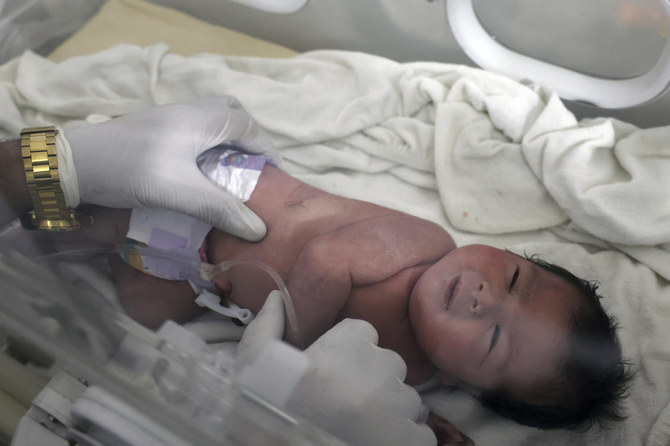
- The newborn girl’s umbilical cord was still connected to her mother, Afraa Abu Hadiya, who was dead
- Baby was the only member of her family to survive from the building collapse Monday in the town of Jinderis
HRW: Israel attack on Lebanon rescuers was ‘unlawful’
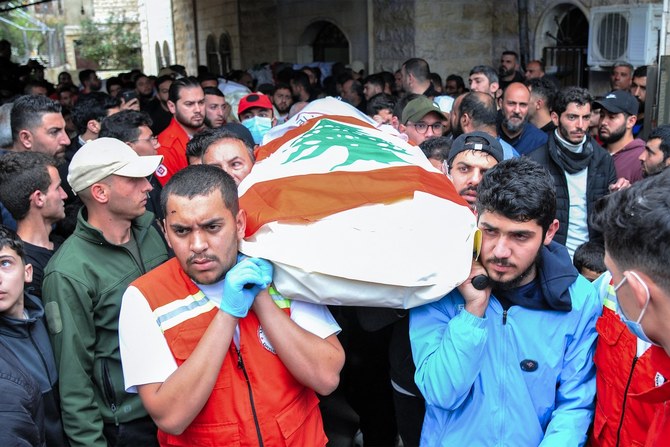
- The rights group urged the United States to “immediately suspend arms sales and military assistance to Israel
Beirut: Human Rights Watch said Tuesday an Israeli strike in Lebanon that killed seven first responders was “an unlawful attack on civilians,” and urged Washington to suspend weapons sales to Israel.
The Israel-Lebanon border area has witnessed near-daily exchanges between the Israeli army and Hamas ally Hezbollah since the Palestinian militant group attacked southern Israel on October 7 sparking war in Gaza.
“An Israeli strike on an emergency and relief center” in the southern village of Habariyeh on March 27 “killed seven emergency and relief volunteers” and constituted an “unlawful attack on civilians that failed to take all necessary precautions,” HRW said in a statement.
“If the attack on civilians was carried out intentionally or recklessly, it should be investigated as an apparent war crime,” it added.
The Israeli military did not immediately comment when contacted by AFP.
But at the time the military said the target was “a military compound” and that the strike killed a “significant terrorist operative” from Jamaa Islamiya, a Lebanese group close to Hamas, and other “terrorists.”
HRW said in the statement that it found “no evidence of a military target at the site,” and said the Israeli strike “targeted a residential structure that housed the Emergency and Relief Corps of the Lebanese Succour Association, a non-governmental humanitarian organization.”
Jamaa Islamiya later denied it was connected to the emergency responders, and the association told AFP it had no affiliation with any Lebanese political organization.
HRW said “the Israeli military’s admission” it had targeted the center in Habariyeh indicated a “failure to take all feasible precautions to verify that the target was military and avoid loss of civilian life... making the strike unlawful.”
The rights group said those killed were volunteers, adding that 18-year-old twin brothers were among the dead.
“Family members... the Lebanese Succour Association, and the civil defense all said that the seven men were civilians and not affiliated with any armed group,” it added.
However, it noted that social media content suggested at least two of those killed “may have been supporters” of Jamaa Islamiya.
HRW said images of weapons parts found at the site included the remains of an Israeli bomb and remnants of a “guidance kit produced by the US-based Boeing Company.”
“Israeli forces used a US weapon to conduct a strike that killed seven civilian relief workers in Lebanon who were merely doing their jobs,” HRW’s Lebanon researcher, Ramzi Kaiss, said.
The rights group urged the United States to “immediately suspend arms sales and military assistance to Israel given evidence that the Israeli military is using US weapons unlawfully.”
Israeli military take control of vital Rafah crossing from Gaza into Egypt
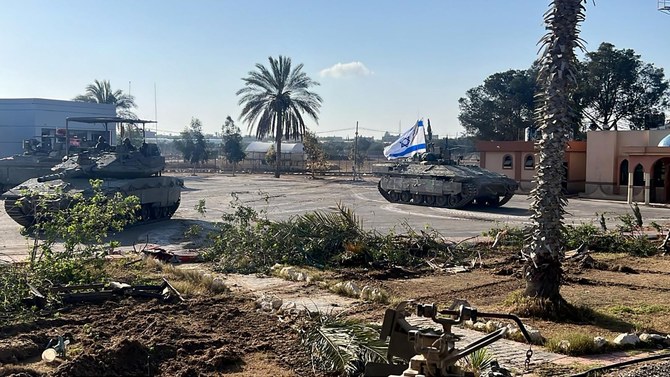
- Israel military takes control of Rafah crossing, special forces scanning area
- Israel says vast majority of people evacuated from military area
JERUSALEM: The Israeli military took control of the vital Rafah border crossing between Gaza and Egypt on Tuesday, pushing into the southern Gazan town after a night of air strikes and as prospects for a ceasefire deal hung in the balance.
The Palestinian militant group Hamas said late on Monday it had agreed to a ceasefire proposal from mediators seven months into the war that has pushed more than a million Gazans into the south of the enclave.
Israel said the terms did not meet its demands and launched a military operation in Rafah.
Israeli tanks and planes pounded several areas and houses in Rafah overnight, killing 20 Palestinians and wounding several others in strikes that hit at least four houses, Palestinian health officials said.
“The Israeli occupation has sentenced the residents of the Strip to death after closure of the Rafah border crossing,” said Hisham Edwan, spokesman for the Gaza Border Crossing Authority. It also condemned to death cancer patients due to the collapse of the health care system, he added.
Israel has been threatening to launch a major incursion in Rafah, which it says harbors thousands of Hamas fighters and potentially dozens of hostages. Victory is impossible without taking Rafah, it says.
Rafah crossing closed
A Gaza border authority spokesperson told Reuters the Rafah crossing, a major route for aid into the devastated enclave, was closed because of the presence of Israeli tanks. Israel’s Army Radio had earlier announced its forces were there.
The United States has been pressing Israel not to launch a military campaign in Rafah until it had drawn up a humanitarian plan for the Palestinians sheltering there, which Washington says it has yet to see.
Israel said the vast majority of people had been evacuated form the area of military operations.
Instructed by Arabic text messages, phone calls and flyers to move to what the Israeli military called an “expanded humanitarian zone” around 20 km (12 miles) away, some Palestinian families began trundling away in chilly spring rain.
Some piled children and possessions onto donkey carts, while others left by pick-up or on foot through muddy streets.
As families dismantled tents and folded belongings, Abdullah Al-Najar said this was the fourth time he had been displaced since the fighting began seven months ago.
“God knows where we will go now. We have not decided yet.”
Truce talks in Cairo
Hamas said in a brief statement that its chief, Ismail Haniyeh, had informed Qatari and Egyptian mediators the group accepted their proposal for a ceasefire.
Israeli Prime Minister Benjamin Netanyahu’s office said later the truce proposal fell short of Israel’s demands but Israel would send a delegation to meet with negotiators to try to reach an agreement.
Qatar’s foreign ministry said its delegation will head to Cairo on Tuesday to resume indirect negotiations between Israel and Hamas.
In a statement, Netanyahu’s office said his war cabinet approved continuing an operation in Rafah. Jordan’s Foreign Minister Ayman Safadi said on social media site X that Netanyahu was jeopardizing a ceasefire by bombing Rafah.
An Israeli official, speaking on condition of anonymity, said the proposal that Hamas approved was a watered-down version of an Egyptian offer and included elements Israel could not accept.
“This would appear to be a ruse intended to make Israel look like the side refusing a deal,” said the Israeli official.
Another official briefed on the agreement said Hamas had agreed to the phased ceasefire and hostage release deal Israel proposed on April 27 with only minor changes that did not affect the main parts of the proposal.
US State Department spokesman Matthew Miller said Washington would discuss the Hamas response with its allies in the coming hours, and a deal was “absolutely achievable.”
Any truce would be the first pause in fighting since a week-long ceasefire in November, during which Hamas freed around half of the hostages.
Since then, all efforts to reach a new truce have foundered over Hamas’ refusal to free more hostages without a promise of a permanent end to the conflict, and Israel’s insistence that it would discuss only a temporary pause.
More than 34,600 Palestinians have been killed in the conflict, according to Gaza health officials. The UN has said famine is imminent in the enclave.
The war began when Hamas militants attacked Israel on Oct. 7, killing about 1,200 people and abducting 252 others, of whom 133 are believed to remain in captivity in Gaza, according to Israeli tallies.
UKMTO receives report two explosions south of Yemen’s Aden
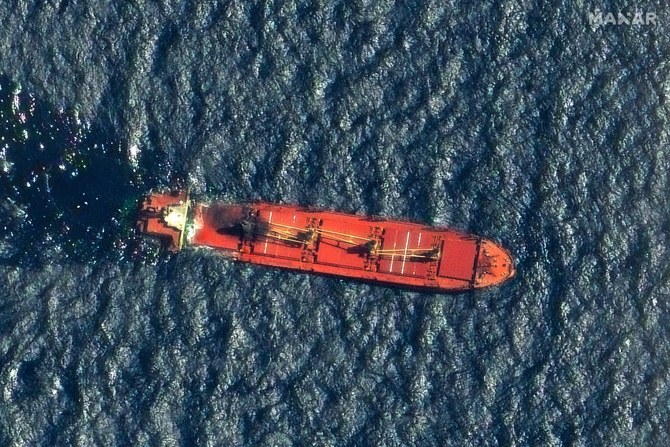
- The Houthi militia that controls the most populous parts of Yemen and is aligned with Iran have staged attacks on ships in the waters off the country for months
Dubai: A merchant vessel passing through the Gulf of Aden off Yemen reported two explosions in “close proximity,” British maritime security agency UKMTO said Tuesday.
The United Kingdom Maritime Trade Operations said the “vessel and all crew are safe,” adding that “authorities are investigating” the blasts south of Yemen’s southern port city of Aden.
UKMTO, which is run by Britain’s Royal Navy, did not provide details on the ship or the nature of attack.
Yemen’s Iran-backed Houthi rebels have launched dozens of drone and missile strikes against ships in the Red Sea and the Gulf of Aden since November.
The Houthis say their campaign is in solidarity with Palestinians amid the Gaza war.
On Friday, they threatened to expand operations targeting Israel-bound shipping to the Mediterranean Sea.
The United States announced an initiative in December to protect Red Sea shipping from Houthi attacks, which have prompted major firms to avoid the route that normally carries 12 percent of global trade.
Since January, the US and Britain have also launched repeated retaliatory strikes on Houthi targets in Yemen.
On Monday, US military forces downed a drone launched by the Houthis over the Red Sea, the US military’s Central Command (CENTCOM) said in a statement.
The drone “presented an imminent threat to US coalition forces and merchant vessels in the region,” CENTCOM said.
Palestinians seek UN General Assembly backing for full membership

- Diplomats say 193-member General Assembly likely to back Palestinian bid
- Others say move could set precedent for others, citing Kosovo and Taiwan as examples
UNITED NATIONS: The United Nations General Assembly could vote on Friday on a draft resolution that would recognize the Palestinians as qualified to become a full UN member and recommend that the UN Security Council “reconsider the matter favorably.”
It would effectively act as a global survey of how much support the Palestinians have for their bid, which was vetoed in the UN Security Council last month by the United States. An application to become a full UN member needs to be approved by the 15-member Security Council and then the General Assembly.
Diplomats say the 193-member General Assembly is likely to back the Palestinian bid. But changes could still be made to the draft after some diplomats raised concerns with the current text, seen by Reuters, that also grants additional rights and privileges — short of full membership — to the Palestinians.
Some diplomats say this could set a precedent for other situations, citing Kosovo and Taiwan as examples.
Israel’s UN Ambassador Gilad Erdan on Monday denounced the current draft General Assembly resolution, saying it would give the Palestinians the de facto status and rights of a state and goes against the founding UN Charter.
“If it is approved, I expect the United States to completely stop funding the UN and its institutions, in accordance with American law,” said Erdan, adding that adoption by the General Assembly would not change anything on the ground.
US CONCERNS
Under US law, Washington cannot fund any UN organization that grants full membership to any group that does not have the “internationally recognized attributes” of statehood. The US halted funding in 2011 for the UN cultural agency (UNESCO)after the Palestinians became a full member.
“It remains the US view that the path toward statehood for the Palestinian people is through direct negotiations,” said Nate Evans, spokesperson for the US mission to the UN
“We are aware of the resolution and reiterate our concerns with any effort to extend certain benefits to entities when there are unresolved questions as to whether the Palestinians currently meet the criteria under the Charter,” he said.
The Palestinians are currently a non-member observer state, a de facto recognition of statehood that was granted by the UN General Assembly in 2012. The Palestinian mission to the UN in New York did not immediately respond to a request for comment on its push for action in the General Assembly.
The Palestinian push for full UN membership comes seven months into a war between Israel and Palestinian militants Hamas in the Gaza Strip, and as Israel is expanding settlements in the occupied West Bank, which the UN considers to be illegal. The United Nations has long endorsed a vision of two states living side by side within secure and recognized borders.
Palestinians want a state in the West Bank, east Jerusalem and Gaza Strip, all territory captured by Israel in 1967.
Palestinians seek UN General Assembly backing for full membership
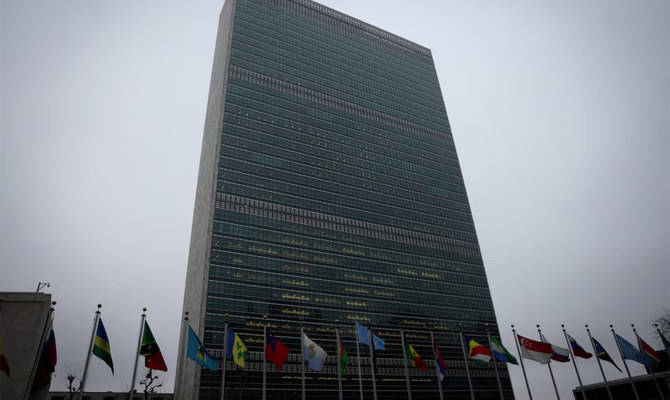
- Diplomats say the 193-member General Assembly is likely to back the Palestinian bid
UNITED NATIONS: The United Nations General Assembly could vote on Friday on a draft resolution that would recognize the Palestinians as qualified to become a full UN member and recommend that the UN Security Council “reconsider the matter favorably.”
It would effectively act as a global survey of how much support the Palestinians have for their bid, which was vetoed in the UN Security Council last month by the United States. An application to become a full UN member needs to be approved by the 15-member Security Council and then the General Assembly.
Diplomats say the 193-member General Assembly is likely to back the Palestinian bid. But changes could still be made to the draft after some diplomats raised concerns with the current text, seen by Reuters, that also grants additional rights and privileges — short of full membership — to the Palestinians.
Some diplomats say this could set a precedent for other situations, citing Kosovo and Taiwan as examples.
Israel’s UN Ambassador Gilad Erdan on Monday denounced the current draft General Assembly resolution, saying it would give the Palestinians the de facto status and rights of a state and goes against the founding UN Charter.
“If it is approved, I expect the United States to completely stop funding the UN and its institutions, in accordance with American law,” said Erdan, adding that adoption by the General Assembly would not change anything on the ground.
US CONCERNS
Under US law, Washington cannot fund any UN organization that grants full membership to any group that does not have the “internationally recognized attributes” of statehood. The US halted funding in 2011 for the UN cultural agency (UNESCO)after the Palestinians became a full member.
“It remains the US view that the path toward statehood for the Palestinian people is through direct negotiations,” said Nate Evans, spokesperson for the US mission to the UN
“We are aware of the resolution and reiterate our concerns with any effort to extend certain benefits to entities when there are unresolved questions as to whether the Palestinians currently meet the criteria under the Charter,” he said.
The Palestinians are currently a non-member observer state, a de facto recognition of statehood that was granted by the UN General Assembly in 2012. The Palestinian mission to the UN in New York did not immediately respond to a request for comment on its push for action in the General Assembly.
The Palestinian push for full UN membership comes seven months into a war between Israel and Palestinian militants Hamas in the Gaza Strip, and as Israel is expanding settlements in the occupied West Bank, which the UN considers to be illegal. The United Nations has long endorsed a vision of two states living side by side within secure and recognized borders. Palestinians want a state in the West Bank, east Jerusalem and Gaza Strip, all territory captured by Israel in 1967.



